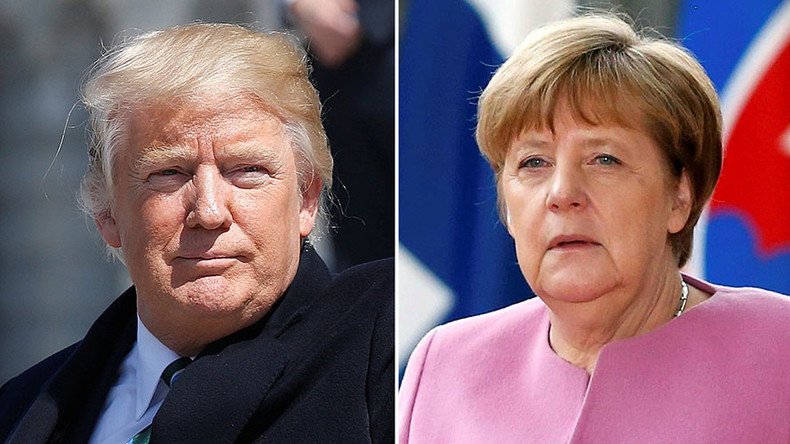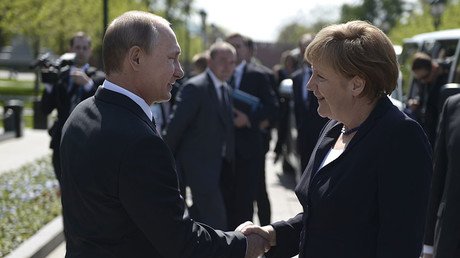‘Merkel’s criticism of Trump hasn’t made life easy for both of them’

Angela Merkel and Donald Trump are professionals, and they are used to dealing with people that they do not like, said Dr. George Szamuely, Senior Research Fellow, Global Policy Institute of London Metropolitan University, ahead of the leaders’ meeting.
The highly anticipated first face-to-face meeting between the leaders of the US and Germany is taking place today. Angela Merkel is in Washington for her encounter with Donald Trump after months of preparation and one postponement due to a blizzard on the East Coast.
While the two leaders seem to occupy opposite ends of the spectrum, some have observed that with German elections looming, Merkel's actually starting to sound a bit like Trump.
RT spoke to Dr. George Szamuely, Senior Research Fellow, Global Policy Institute of London Metropolitan University, and asked what the meeting between the leaders would look like and what questions would be discussed.
RT: As different in their personal lives, how will Chancellor Merkel prepare to meet a president like Trump. Can they get along in a professional capacity?
George Szamuely: They are both professionals, and they are both used to dealing with people that they do not necessarily like and they don’t necessarily get on with. Merkel hasn’t made life easy for either of them by being so critical of Trump. It was striking that when Trump won the election on November, 8, she was one of the last leaders to get in touch with him to congratulate him and she even made a statement that was rather snide about him and talked about Western values. But I imagine that during this visit she won’t dare lecture. She is probably being told that Trump doesn’t take kindly to being lectured. So, I think she will address him in a business-like professional way, and she won’t start lecturing him and giving him sanctimonious talk about Western values because she knows that Trump doesn’t like that kind of stuff.
RT: Is Donald Trump's foreign policy, the banning of people from some predominately Muslim countries from entering the US, building a wall with Mexico, rejecting refugees, likely to cause friction between the two?
GS: In theory yes, but I think that Merkel will come to the US with the position that all of these questions are domestic American issues. She may say “Well, we don’t necessarily agree with your position on refugees, we don’t necessarily agree with your position on building the wall. We only want to discuss issues that involve the two of us.” Trade, NATO, relationship with Russia, but questions about refugees and Muslim nations and so on, I think she will just live that on the backbone. She will have been instructed by her advisers that if she brings that up, it will just simply annoy Trump.
RT: German Chancellor has been deviating from her welcome-door rhetoric recently calling for faster deportations of failed asylum seekers also saying that external borders should be protected to keep Schengen. Does this make her stance closer to that of Donald Trump? Does Merkel’s changing rhetoric have something to do with the upcoming elections in Germany?
GS: Yes, it does. But she is facing serious re-election challenge in September, and she is taking this position because she is anxious about the Alternative for Germany (AfD) party which is clearly eating into her support…She has veered to the right on this issue in order to fend off the AfD…Merkel has been all over the shop on any number of issues, particularly on this issue of refugees. If you remember, she announced in 2010 that multiculturalism has failed; it’s a completely failed experiment. Then she suddenly veered to the opposite extreme and announced this ridiculous notion that she was going to import a million Muslim refugees from the Middle East. Now she sort of veered again back to her older position. She has been all over the place, I don’t see one should take seriously anything that she says. She will say something different after the election - if she is reelected, of course.
RT: When the Defense Secretary and Secretary of State were in Munich for the Security Conference, they both spoke about the need for NATO members to pay their fair share. Would you expect the president to raise this issue also?
GS: Yes, I am sure he will raise the issue and I am quite sure that Merkel will reassure him that “yes, indeed, you are absolutely right, we should all pay our fair share and Germany will indeed pay its fair share.” But of course, Germany will not pay its fair share. All these promises have been made any number of times before, and the Germans are not going to do it. The only way that Trump could get in his way on this issue, to get NATO members, particularly Germany, to pay their fair share, is if he meant seriously his threat to basically drop NATO – minimize American commitment to NATO…
The statements, views and opinions expressed in this column are solely those of the author and do not necessarily represent those of RT.














